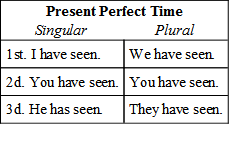PERFECT TIME
121. Past, present and future, being the three divisions of time, one would naturally expect that when we had found how to express these three forms, we would be through, but if you stop to think, you will find that there are other verb phrases of which we have need.
When we wish to speak of action as completed at the present time, we do not say:
I study my lessons every day, but, I have studied my lessons every day.
Not, You work for him every day, but, You have worked for him every day.
Not, He sees her frequently, but, He has seen her frequently.
Can you not readily see the difference in the meaning expressed in I work every day, and I have worked every day? In the first sentence you express a general truth, I work every day, a truth which has been true in the past, is true in the present, and the implication is that it will continue to be true in the future. But when you say, I have worked every day, you are saying nothing as to the future, but you are describing an action which is completed at the present time. This is called the present complete or present perfect time.
122. Perfect means complete, and present perfect describes an action perfected or completed at the present time. So it is possible for us to express a necessary shade of meaning by the present perfect time form.
123. The present perfect time form describes an action completed at the present time, and is formed by using the present time form of have and the past participle of the verb.

124. Review in the last lesson how to form the past participle. Remember that it is one of the principal parts of the verb. In regular verbs the past participle is the same form as the past time form. In irregular verbs the past participle is quite often different from the past time form, as for example: go, went, gone; do, did, done, etc.
Watch closely your irregular verbs and see that you always use the past participle with have or had; never use the past time form with have or had.
Более 800 000 книг и аудиокниг! 📚
Получи 2 месяца Литрес Подписки в подарок и наслаждайся неограниченным чтением
ПОЛУЧИТЬ ПОДАРОКДанный текст является ознакомительным фрагментом.